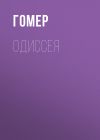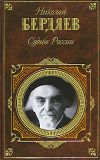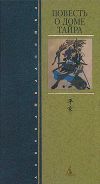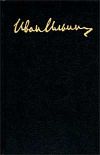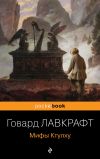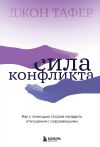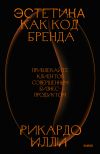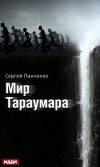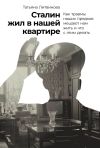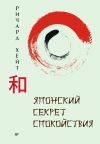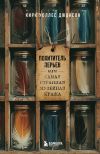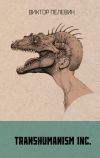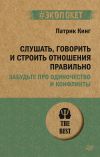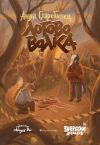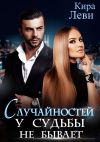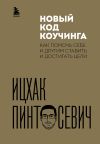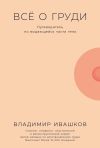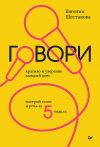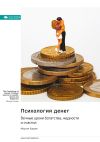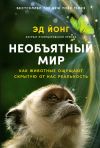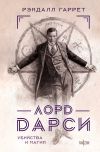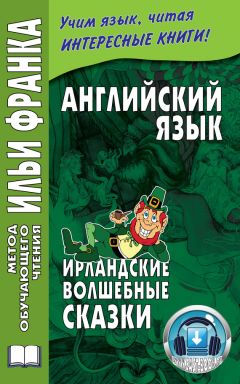
Автор книги: Оскар Уайльд
Жанр: Иностранные языки, Наука и Образование
Возрастные ограничения: +12
сообщить о неприемлемом содержимом
Текущая страница: 5 (всего у книги 16 страниц) [доступный отрывок для чтения: 5 страниц]
“I’ll not go to my father (я не пойду к своему отцу) if I have to leave you (если мне придется оставить тебя; to have to do smth. – быть должным, обязанным, вынужденным делать что-л.; to leave – уходить, уезжать; покидать, бросать),” said she.

She stayed that night, for she had good welcome. Next morning when she went out, her husband said, “You’d better go home now to your father.”
“I’ll not go to my father if I have to leave you,” said she.
So he went on (и вот он пошел дальше; to go /went, gone/), and she followed (а она последовала /за ним/). It was that way all the day (и так продолжалось весь день: «это было таким образом весь день»; way – путь, дорога; образ действия, способ) till night came (пока не наступила ночь; to come /came, come/ – идти, приходить; наступать, приходить); and at nightfall they saw another house at the foot of a hill (а при наступлении ночи они увидели другой дом у подножья холма; to see /saw, seen/; foot – нога, ступня ноги; подножие, подошва), and again the husband stopped and said (и снова муж остановился и сказал), “You go in (ты ступай в /дом/); I’ll stop outside till morning (я останусь снаружи до утра; to stop – останавливать; останавливаться /на непродолжительное время/, гостить).”

So he went on, and she followed. It was that way all the day till night came; and at nightfall they saw another house at the foot of a hill, and again the husband stopped and said, “You go in; I’ll stop outside till morning.”
The woman of the house gave her a good welcome (хозяйка дома радушно встретила ее: «дала ей хороший прием»; to give /gave, given/). After she had eaten and drunk (после того, как она поела и попила; to eat /ate, eaten/; to drink /drank, drunk/), a little boy came out of another room (какой-то маленький мальчик вышел из другой комнаты; little – маленький, небольшой; маленький /по возрасту/, младший), ran to her knee (подбежал к ее колену; to run /ran, run/), and said, “Mother”. The woman of the house sent the boy back (хозяйка дома отослала мальчика назад; to send /sent/) to where he had come from (туда, откуда он вышел), and told him to stay there (и велела ему оставаться там; to tell /told/).

The woman of the house gave her a good welcome. After she had eaten and drunk, a little boy came out of another room, ran to her knee, and said, “Mother”. The woman of the house sent the boy back to where he had come from, and told him to stay there.
Next morning (на следующее утро), when the princess was going out to her husband (когда принцесса собиралась во двор: «выходила наружу», к своему мужу), the woman of the house gave her a comb (хозяйка дома дала ей гребень; to give /gave, given/), and said, “If you meet any person with a diseased and a sore head (если ты повстречаешь кого-нибудь, у кого болит голова или она покрыта язвами: «любого человека с больной и воспаленной головой»; disease – болезнь; diseased – больной, заболевший; sore – болячка, язва; sore – болезненный, больной, воспаленный), and draw this comb over it three times (проведи этим гребнем по ней трижды: «и проведешь этим гребнем по ней три раза»; to draw /drew, drawn/ – тащить, волочить, тянуть; перемещать, передвигать), the head will be well (голова излечится: «будет выздоровевшей»), and covered with the most beautiful golden hair ever seen (и покроется: «/будет/ покрыта» самыми красивыми золотыми волосами, когда-либо виденными; to see /saw, seen/).”
She took the comb (она взяла гребень; to take /took, taken/), and went out to her husband (и вышла /во двор/ к своему мужу).

Next morning, when the princess was going out to her husband, the woman of the house gave her a comb, and said, “If you meet any person with a diseased and a sore head, and draw this comb over it three times, the head will be well, and covered with the most beautiful golden hair ever seen.”
She took the comb, and went out to her husband.
“Leave me now (оставь меня теперь),” said he, “and go back to your own father (и возвращайся: «иди обратно» к своему родному отцу; back – обратно, назад; own – свой собственный, принадлежащий /кому-л. или чему-л./; собственный, родной).”
“I will not (я не /пойду/),” said she, “but I will follow you (а буду следовать за тобой) while I have the power (пока у меня есть силы; power – сила, мощь; /умственная или физическая/ способность).” So they went forward that day (так что они шли дальше: «вперед» /весь/ тот день), as on the other two (как и в другие два = как и в предыдущие два дня).

“Leave me now,” said he, “and go back to your own father.”
“I will not,” said she, “but I will follow you while I have the power.” So they went forward that day, as on the other two.
At nightfall they came to a third house, at the foot of a hill (с наступлением ночи они пришли к третьему дому у подножия холма; foot – нога, ступня ноги; подножие, подошва), where the princess received a good welcome (где принцесса получила радушный прием; to receive – получать; встретить, получить; good – хороший; добрый, доброжелательный). After she had eaten supper (после того, как она съела ужин; to eat /ate, eaten/), a little girl with only one eye came to her knee (какая-то маленькая девочка с одним только глазом подошла к ее колену) and said, “Mother.”

At nightfall they came to a third house, at the foot of a hill, where the princess received a good welcome. After she had eaten supper, a little girl with only one eye came to her knee and said, “Mother.”
The princess began to cry at sight of the child (принцесса начала плакать при виде этого ребенка; to begin /began, begun/; to cry – кричать, орать; плакать; sight – вид), thinking that she herself was the cause (думая, что это она сама была причиной того) that it had but one eye (что у нее был только один глаз). Then she put her hand into her pocket (затем она сунула свою руку в карман; to put /put/ – класть, ставить, положить) where she kept the handkerchief (где она хранила платочек; to keep /kept/ – оставлять себе, сохранять) on which she had dropped the tear (на который она уронила слезу; to drop – капать, стекать каплями; капать, выпускать по капле) when the gray crow carried her infant away (когда серая ворона унесла прочь ее ребенка: «младенца»). She had never used the handkerchief since that day (она никогда не пользовалась этим платком с того /самого/ дня), for there was an eye on it (потому что в нем был /детский/ глазик: «там был глаз на нем»).

The princess began to cry at sight of the child, thinking that she herself was the cause that it had but one eye. Then she put her hand into her pocket where she kept the handkerchief on which she had dropped the tear when the gray crow carried her infant away. She had never used the handkerchief since that day, for there was an eye on it.
She opened the handkerchief (она открыла = развернула платок), and put the eye in the girl’s head (и вернула глазик в глазницу: «поместила глаз в голову девочки»). It grew into the socket that minute (он врос в глазницу в ту же минуту; socket – впадина, углубление, гнездо; eye socket – глазная впадина, глазница; to grow /grew, grown/ – расти; to grow into smth. – врастать во что-л.), and the child saw out of it as well as out of the other eye (и девочка стала видеть им так же хорошо, как и вторым глазом: «ребенок видел из него так же хорошо, как и из другого глаза»; to see /saw, seen/); and then the woman of the house sent the little one to bed (и тогда хозяйка дома отправила малышку спать: «послала малышку в кровать»; little – маленький, небольшой; маленький /по возрасту/, младший).

She opened the handkerchief, and put the eye in the girl’s head. It grew into the socket that minute, and the child saw out of it as well as out of the other eye; and then the woman of the house sent the little one to bed.
Next morning (на следующее утро), as the king’s daughter was going out (когда королевская дочь выходила /из дома/), the woman of the house gave her a whistle (хозяйка дома дала ей свисток; to give /gave, given/; whistle – свист; свисток), and said, “Whenever you put this whistle to your mouth (всякий раз как ты поднесешь: «приложишь» этот свисток ко рту) and blow on it (и подуешь в него: «на него»; to blow – дуть, веять /о ветре/; дуть /в свисток/), all the birds of the air (все птицы небесные: «все птицы воздуха»; air – воздух, атмосфера; воздушное пространство, небо) will come to you from every quarter under the sun (прилетят к тебе со всех частей света: «с каждой части света под солнцем»; quarter – четверть, четвертая часть; страна света, часть света). Be careful of the whistle (береги этот свисток: «будь заботлива о свистке»; care – забота; careful – заботливый, внимательный), as it may serve you greatly (ибо он может весьма тебе помочь: «послужить»; to serve – служить; быть полезным, оказывать пользу, содействие).”

Next morning, as the king’s daughter was going out, the woman of the house gave her a whistle, and said, “Whenever you put this whistle to your mouth and blow on it, all the birds of the air will come to you from every quarter under the sun. Be careful of the whistle, as it may serve you greatly.”
“Go back to your father’s castle (возвращайся: «иди обратно» в замок своего отца),” said the husband when she came to him (сказал муж, когда она вышла к нему), “for I must leave you today (потому что я должен оставить тебя сегодня).”
They went on together a few hundred yards (они прошли вместе /еще/ несколько сотен ярдов; few – немного, мало; a few – несколько; yard – ярд /мера длины = 3 фута, ок. 91,44 см), and then sat on a green hillock (а затем сели на зеленый холмик; to sit /sat/), and he told the wife (и он рассказал жене; to tell /told/),

“Go back to your father’s castle,” said the husband when she came to him, “for I must leave you today.”
They went on together a few hundred yards, and then sat on a green hillock, and he told the wife,
“Your mother has come between us (твоя мать встала: «вошла» между нами); but for her (если бы не она; but – кроме; если не, как не; but for – если бы не) we might have lived together all our days (мы могли бы жить вместе всю жизнь: «все наши дни»; day – день; дни жизни, жизнь). If I had been allowed (если бы мне было позволено) to pass three nights with you in your father’s house (провести с тобой три ночи в доме твоего отца; to pass – идти, проходить; проводить /время, день и т. п./), I should have got back my form of a man (я бы вернул себе человеческий облик: «получил обратно свой облик человека»; to get /got/; form – форма, внешний вид; обличье) both in the daytime and the night (навсегда: «как в дневное время, так и ночью»; both… and – не только… но и, как… так и).

“Your mother has come between us; but for her we might have lived together all our days. If I had been allowed to pass three nights with you in your father’s house, I should have got back my form of a man both in the daytime and the night.
The Queen of Tir na n-Og[5]5
Tir na n-Og (Тир на Ног) – в кельтской мифологии «остров юных», страна вечной молодости.
[Закрыть] [the land of youth] enchanted (королева Страны Юности заколдовала /меня/; land – земля, суша; страна, территория, царство; to enchant – очаровать, обворожить; заколдовывать, зачаровывать) and put on me a spell (и наложила на меня заклятие; spell – заклинание, колдовской наговор), that unless I could spend three nights with a wife (что, пока я не проведу: «смогу провести» три ночи с женой; to spend – тратить, расходовать; проводить /время/) under her father’s roof in Erin (в доме ее отца в Ирландии; roof – крыша, кровля; кров; under one’s roof – в доме, под крышей), I should bear the form of a white dog one half of my time (половину своей жизни я буду проводить в обличии белого пса: «буду носить облик белого пса одну половину моего времени»; to bear /bore, born/ – носить, переносить, перевозить; иметь, нести на себе; time – время; период жизни, век); but if the skin of the dog should be burned (но если шкура пса будет сожжена; skin – кожа; кожа, шкура, мех животного) before the three nights were over (до того, как истекут три ночи; over – наверху, наверх; указывает на окончание чего-л.), I must go down to her kingdom (я должен буду спуститься в ее королевство) and marry the queen herself (и жениться на самой королеве). And ’t is to her I am going today (и именно к ней я сегодня иду). I have no power to stay (остаться не в моих силах: «у меня нет возможности остаться»; power – сила, мощь; /умственная или физическая/ способность), and I must leave you (и я должен оставить тебя); so farewell (так что прощай), you’ll never see me again on the upper earth (ты никогда больше не увидишь меня на этом свете: «никогда не увидишь меня снова на верхней земле»).”

The Queen of Tir na n-Og [the land of youth] enchanted and put on me a spell, that unless I could spend three nights with a wife under her father’s roof in Erin, I should bear the form of a white dog one half of my time; but if the skin of the dog should be burned before the three nights were over, I must go down to her kingdom and marry the queen herself. And ‘t is to her I am going today. I have no power to stay, and I must leave you; so farewell, you’ll never see me again on the upper earth.”
He left her sitting on the mound (он оставил ее сидящей на холме; to leave /left/ – оставлять в каком-л. положении или состоянии; mound – насыпь, холм, курган), went a few steps forward to some bulrushes (сделал несколько шагов в направлении зарослей камыша: «прошел несколько шагов вперед к камышам»), pulled up one (вытащил один /из них/), and disappeared in the opening (и исчез в отверстии) where the rush had been (где /прежде/ был камыш).

He left her sitting on the mound, went a few steps forward to some bulrushes, pulled up one, and disappeared in the opening where the rush had been.
She stopped there (она оставалась там; to stop – останавливать, задерживать; оставаться, не уходить), sitting on the mound lamenting (сидя на холме /и/ горько плача; to lament – стенать; горько жаловаться; сетовать), till evening (до вечера), not knowing what to do (не зная, что делать). At last she bethought herself (наконец она опомнилась; to bethink /bethought/ – размышлять, поразмыслить, призадуматься), and going to the rushes (и, подойдя к зарослям камыша: «тростникам»), pulled up a stalk (вытащила один стебель), went down (пошла = спустилась вниз), followed her husband (последовала за своим супругом), and never stopped (и ни разу не остановилась; never – никогда; ни разу) till she came to the lower land (пока /не/ дошла до подземного царства: «нижней страны»; land – земля, суша; страна, территория, царство).

She stopped there, sitting on the mound lamenting, till evening, not knowing what to do. At last she bethought herself, and going to the rushes, pulled up a stalk, went down, followed her husband, and never stopped till she came to the lower land.
After a while (спустя некоторое время; while – время, промежуток времени) she reached a small house near a splendid castle (она добралась до маленького домика вблизи великолепного дворца; to reach – протягивать, вытягивать, простирать; достигать /места назначения/, доезжать, доходить, добираться). She went into the house and asked (она вошла в этот дом и спросила), could she stay there till morning (/не/ может ли она остаться там до утра). “You can (можешь: «ты можешь»),” said the woman of the house (сказала хозяйка дома), “and welcome (и добро пожаловать).”

After a while she reached a small house near a splendid castle. She went into the house and asked, could she stay there till morning. “You can,” said the woman of the house, “and welcome.”
Next day the woman of the house was washing clothes (на следующий день хозяйка дома стирала одежду; to wash – мыть; стирать), for that was how she made a living (потому что именно так она зарабатывала на жизнь; to make /made/ – делать; зарабатывать, наживать /деньги, состояние/; living – средства к существованию; to make a living – зарабатывать на жизнь). The princess fell to (принцесса тоже стала стирать: «приступила /к работе/»; to fall /fell, fallen/ – падать; to fall to /doing smth./ – браться, приниматься /за что-либо/, начинать делать что-л.) and helped her with the work (и помогла ей с работой). In the course of that day (в тот же день: «в течение того дня»; course – курс, направление; ход, течение; in the course of – в ходе, в процессе, в течение) the Queen of Tir na n-Og and the husband of the princess were married (королева Страны Юности и муж принцессы поженились).

Next day the woman of the house was washing clothes, for that was how she made a living. The princess fell to and helped her with the work. In the course of that day the Queen of Tir na n-Og and the husband of the princess were married.
Near the castle (вблизи замка), and not far from the washer-woman’s (и недалеко от /дома/ прачки; washer – тот кто моет, стирает; woman – женщина; работница, служанка; washerwoman – прачка), lived a henwife (жила птичница; hen – курица; wife – жена, супруга; компонент сложных слов, женщина какой-л. профессии; henwife – птичница) with two ragged little daughters (у которой были две маленькие дочки, одетые в лохмотья: «с двумя оборванными маленькими дочерьми»; rag – тряпка, лоскут; отрепья, лохмотья; ragged – рваный, потрепанный; оборванный, в лохмотьях; little – маленький, небольшой; маленький /по возрасту/, младший). One of them came around the washer-woman’s house to play (одна из них пришла к дому прачки поиграть; to come /came, come/ round – объезжать, обходить; заходить, заезжать). The child looked so poor (ребенок выглядел таким жалким; to look – смотреть, глядеть; выглядеть, иметь вид, казаться; poor – бедный, неимущий; жалкий, скудный) and her clothes were so torn and dirty (и ее одежда была такой рваной и грязной; to tear /tore, torn/ – рвать, разрывать; изнашиваться, рваться) that the princess took pity on her (что принцесса сжалилась над ней; to take /took, taken/; pity – жалость, сострадание; to take pity on smb. – сжалиться над кем-л.) and cut the clothes with the scissors which she had (и разрезала одежду ножницами, которые у нее были).

Near the castle, and not far from the washer-woman’s, lived a henwife with two ragged little daughters. One of them came around the washer-woman’s house to play. The child looked so poor and her clothes were so torn and dirty that the princess took pity on her, and cut the clothes with the scissors which she had.
That moment the most beautiful dress of cloth of gold (в тот же момент самое прекрасное платье из золотой парчи: «ткани из золота») ever seen on woman or child in that kingdom (когда-либо виденное на женщине или ребенке в том королевстве; to see /saw, seen/) was on the henwife’s daughter (было на дочери птичницы).
When she saw what she had on (когда она увидела, что было на ней /надето/: «что она имела на /себе/»), the child ran home to her mother (девочка побежала: «ребенок побежал» домой к своей матери; to run /ran, run/) as fast as ever she could go (со всех ног: «так быстро, как только она могла идти»).

That moment the most beautiful dress of cloth of gold ever seen on woman or child in that kingdom was on the henwife’s daughter.
When she saw what she had on, the child ran home to her mother as fast as ever she could go.
“Who gave you that dress (кто дал тебе это платье; to give /gave, given/)?” asked the henwife (спросила птичница).
“A strange woman (одна незнакомая женщина) that is in that house beyond (которая вон в том доме; beyond – вдали, на расстоянии; за, по ту сторону),” said the little girl (сказала маленькая девочка), pointing to the washer-woman’s house (показывая на дом прачки).

“Who gave you that dress?” asked the henwife.
“A strange woman that is in that house beyond,” said the little girl, pointing to the washer-woman’s house.
The henwife went straight to the Queen of Tir na n-Og and said (птичница пошла прямо к королеве Страны Юности и сказала; straight – по прямой линии, прямо; прямо, непосредственно), “There is a strange woman in the place (есть тут одна незнакомая женщина в этом месте = в наших краях), who will be likely to take your husband from you (которая, вполне вероятно, заберет у тебя твоего мужа; likely – вероятный, возможный; to take – брать; отбирать, забирать), unless you banish her away (если только ты не прогонишь ее прочь; unless – если не, пока не; to banish – изгонять, ссылать; прогонять, выгонять, выдворять) or do something to her (или не сделаешь что-нибудь с ней); for she has a pair of scissors (потому что у нее есть ножницы: «пара ножниц») different from anything ever seen or heard of in this country (каких в нашей стране никогда не видали и не слыхали о таких: «отличающиеся от чего-либо когда-либо виденного или слышанного в этой стране»; to see /saw, seen/; to hear /heard/; this – это; этот, эта, это; in this country – в этой или нашей стране /в которой мы находимся/).”

The henwife went straight to the Queen of Tir na n-Og and said, “There is a strange woman in the place, who will be likely to take your husband from you, unless you banish her away or do something to her; for she has a pair of scissors different from anything ever seen or heard of in this country.”
When the queen heard this (когда королева услышала это) she sent word to the princess that (она сообщила принцессе: «отправила сообщение принцессе», что; to send /sent/ – посылать, отправлять; word – слово; вести, известие, сообщение; to send word – сообщать, извещать), unless the scissors were given up to her without delay (если ножницы не будут отданы ей без промедления; to give up – отказаться, бросить /привычку/; сдавать, отдавать; delay – задержка, приостановка; замедление, промедление), she would have the head off her (она прикажет отрубить ей голову: «она будет иметь голову снесенной с нее»; to have smth. done – велеть, приказать сделать что-л. для себя).
The princess said she would give up the scissors (принцесса сказала, что она отдаст ножницы) if the queen would let her (если королева позволит ей; to let – позволять; to let smb. do smth. – разрешить, позволить кому-л. сделать что-л.) pass one night with her husband (провести одну ночь с ее супругом; to pass – идти, проходить; проводить /время, день и т. п./).

When the queen heard this she sent word to the princess that, unless the scissors were given up to her without delay, she would have the head off her.
The princess said she would give up the scissors if the queen would let her pass one night with her husband.
The queen answered (королева ответила) that she was willing to give her the one night (что она согласна дать ей эту одну ночь; willing – готовый, согласный). The princess came and gave up the scissors (принцесса пришла и отдала ножницы), and went to her own husband (и пошла к своему собственному мужу); but the queen had given him a drink (но королева дала ему зелье: «напиток»; drink – питье; напиток), and he fell asleep (и он заснул; to fall /fell, fallen/ – падать; становиться, перейти в определенное состояние; asleep – спящий; to fall asleep – заснуть), and never woke (и так и не проснулся; never – никогда; /эмоц. – усил./ нисколько, никоим образом; to wake /woke, woken/) till after the princess had gone in the morning (до того момента, когда принцесса ушла поутру: «до после того, как принцесса ушла утром»).

The queen answered that she was willing to give her the one night. The princess came and gave up the scissors, and went to her own husband; but the queen had given him a drink, and he fell asleep, and never woke till after the princess had gone in the morning.
Next day another daughter of the henwife (на следующий день другая дочь птичницы) went to the washer-woman’s house to play (пошла к дому прачки поиграть). She was wretched-looking (у нее был такой жалкий вид: «она была несчастно выглядящей»; wretch – несчастный, жалкий человек; wretched – несчастный, жалкий; to look – смотреть; иметь вид, выглядеть, казаться), her head being covered (ее голова была покрыта) with scabs (струпьями) and sores (и болячками).

Next day another daughter of the henwife went to the washer-woman’s house to play. She was wretched-looking, her head being covered with scabs and sores.
The princess drew the comb three times over the child’s head (принцесса провела гребнем трижды по голове ребенка; to draw /drew, drawn/ – тащить, волочить, тянуть; перемещать, передвигать; time – время; раз, случай), cured it (излечила ее), and covered it with beautiful golden hair (и покрыла ее прекрасными золотыми волосами). The little girl ran home (маленькая девочка побежала домой; to run /ran, run/) and told her mother (и рассказала своей матери; to tell /told/) how the strange woman had drawn the comb over her head (как та самая незнакомая женщина провела гребнем по ее голове), cured it (излечила ее = голову), and given her beautiful golden hair (и одарила ее прекрасными золотыми волосами).

The princess drew the comb three times over the child’s head, cured it, and covered it with beautiful golden hair. The little girl ran home and told her mother how the strange woman had drawn the comb over her head, cured it, and given her beautiful golden hair.
The henwife hurried off to the queen and said (птичница поспешила к королеве и сказала), “That strange woman has a comb with wonderful power to cure (у той незнакомой женщины есть гребень с чудесной силой исцелять), and give golden hair (и давать золотые волосы); and she’ll take your husband from you (и она заберет у тебя твоего мужа) unless you banish her or take her life (если только ты не прогонишь или не убьешь ее: «возьмешь ее жизнь»).”

The henwife hurried off to the queen and said, “That strange woman has a comb with wonderful power to cure, and give golden hair; and she’ll take your husband from you unless you banish her or take her life.”
The queen sent word to the princess (королева сообщила принцессе: «отправила сообщение принцессе») that unless she gave up the comb (что если та не отдаст гребень), she would have her life (то она отнимет у нее жизнь: «будет иметь = возьмет ее жизнь»).
The princess returned as answer (принцесса ответила: «вернула в качестве ответа»; to return – возвращаться, идти обратно; отвечать, возражать) that she would give up the comb (что она отдаст гребень) if she might pass one night with the queen’s husband (если она сможет провести одну ночь с мужем королевы; to pass – идти, проходить; проводить /время, день и т. п./).

The queen sent word to the princess that unless she gave up the comb, she would have her life.
The princess returned as answer that she would give up the comb if she might pass one night with the queen’s husband.
The queen was willing (королева согласилась: «была согласная»), and gave her husband a draught as before (и дала своему супругу глоток зелья, как и прежде; draught – глоток; доза жидкого лекарства,). When the princess came (когда принцесса пришла), he was fast asleep (он крепко спал: «был крепко спящим»), and did not waken till after she had gone in the morning (и не проснулся до тех самых пор, когда она ушла поутру).

The queen was willing, and gave her husband a draught as before. When the princess came, he was fast asleep, and did not waken till after she had gone in the morning.
On the third day (на третий день) the washerwoman and the princess went out to walk (прачка и принцесса вышли погулять), and the first daughter of the henwife with them (и первая дочь птичницы /вместе/ с ними). When they were outside the town (когда они были за городом: «вне города»), the princess put the whistle to her mouth and blew (принцесса приложила свисток ко рту и дунула; whistle – свист; свисток; to blow – дуть, веять /о ветре/; дуть /в свисток/). That moment the birds of the air flew to her (в тот самый момент птицы небесные слетелись к ней; air – воздух, атмосфера; воздушное пространство, небо; to fly /flew, flown/ – летать, лететь) from every direction in flocks (стайками со всех сторон: «с каждого направления в стаях»). Among them was a bird of song and new tales (среди них была и певчая птица, которая рассказывала новые истории: «птица пения и новых сказаний»; song – песня; пение; tale – рассказ, история).

On the third day the washerwoman and the princess went out to walk, and the first daughter of the henwife with them. When they were outside the town, the princess put the whistle to her mouth and blew. That moment the birds of the air flew to her from every direction in flocks. Among them was a bird of song and new tales.
The princess went to one side with the bird (принцесса отошла в сторону с этой птицей). “What means can I take (какие меры я могу предпринять; means – средство, способ; to take – брать; в сочетании существительным выражает действие, носящее общий характер),” asked she (спросила она), “against the queen to get back my husband (против королевы, чтобы вернуть: «получить обратно» своего супруга)? Is it best to kill her (будет ли самым лучшим убить ее), and can I do it (и смогу ли я сделать это)?”

The princess went to one side with the bird. “What means can I take,” asked she, “against the queen to get back my husband? Is it best to kill her, and can I do it?”
“It is very hard (очень трудно; hard – твердый; трудный, тяжелый, требующий напряжения),” said the bird (сказала птица), “to kill her (убить ее). There is no one in all Tir na n-Og (нет никого во всей Стране Юности) who is able to take her life (кто был бы способен убить ее: «забрать ее жизнь») but her own husband (кроме ее собственного мужа). Inside a holly-tree in front of the castle (внутри падуба перед замком; holly – падуб; tree – дерево) is a wether (есть валух /кастрированный баран/), in the wether a duck (в валухе – утка), in the duck an egg (в утке – яйцо), and in that egg is her heart and life (а в том яйце – ее сердце и жизнь). No man in Tir na n-Og can cut that holly-tree but her husband (никто: «никакой человек» в Стране Юности не может срубить тот падуб, кроме ее мужа; to cut /cut/ – резать; рубить, валить /лес/).”

“It is very hard,” said the bird, “to kill her. There is no one in all Tir na n-Og who is able to take her life but her own husband. Inside a holly-tree in front of the castle is a wether, in the wether a duck, in the duck an egg, and in that egg is her heart and life. No man in Tir na n-Og can cut that holly-tree but her husband.”
The princess blew the whistle again (принцесса снова дунула в свисток; to blow /blew, blown/). A fox and a hawk came to her (лиса и ястреб пришли к ней). She caught and put them into two boxes (она поймала и поместила их в две коробки; to catch /caught/; to put /put/), which the washerwoman had with her (которые были у прачки с собой: «прачка имела с собой»), and took them to her new home (и взяла = отнесла их в свой новый дом; to take /took, taken/).
Внимание! Это не конец книги.
Если начало книги вам понравилось, то полную версию можно приобрести у нашего партнёра - распространителя легального контента. Поддержите автора!Правообладателям!
Данное произведение размещено по согласованию с ООО "ЛитРес" (20% исходного текста). Если размещение книги нарушает чьи-либо права, то сообщите об этом.Читателям!
Оплатили, но не знаете что делать дальше?











